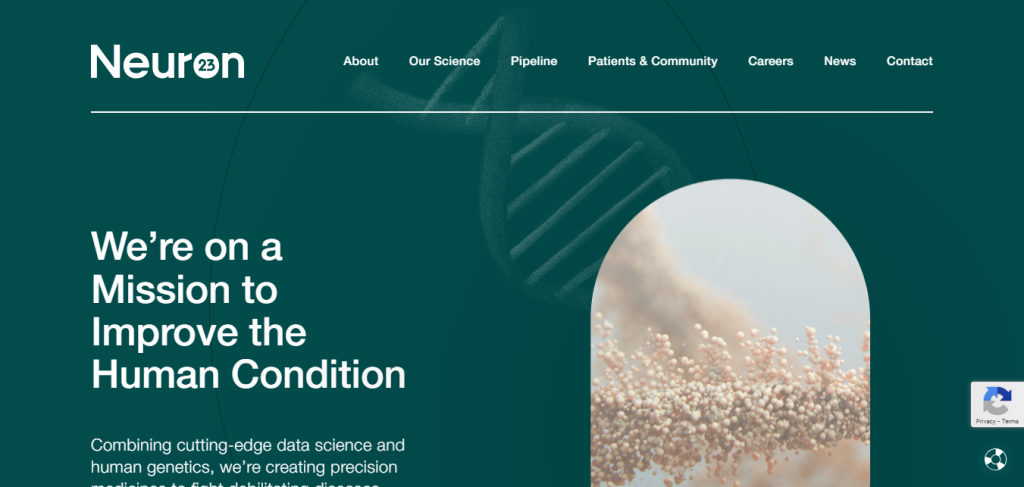Neuron23 Secures $96.5M Series D to Advance Precision Medicine for Neurological Disorders
July 10, 2025
byFenoms Startup Research

Neuron23, a precision neuromedicine startup based in South San Francisco, has just closed a $96.5 million Series D funding round to further its mission of transforming neurological care. The round attracted top-tier investors including Westlake Village BioPartners, SoftBank Vision Fund 2, Redmile Group, Kleiner Perkins, and Acorn Bioventures, among others.
At the helm is Nancy Stagliano, a seasoned biotech leader steering Neuron23 toward a future where AI-driven insights and genetic precision converge to treat complex neurodegenerative conditions such as Parkinson’s disease and ALS.
A Market Poised for Disruption
According to Fortune Business Insights, the global neurology drug market is projected to surpass $128 billion by 2030, driven by an aging population and increased prevalence of chronic brain conditions. At the same time, the rise of AI-powered platforms is shortening drug discovery timelines - McKinsey reports that machine learning is reducing early-stage R&D cycles by up to 30% and trial dropout rates by up to 20% when patient stratification is applied.
Neuron23 fits squarely at this intersection. Its combination of computational prediction models, real-world biomarker data, and carefully designed clinical pipelines gives it a structural edge in one of biotech’s most complex verticals.
The company’s platform is currently advancing candidates in multiple indications, with a focus on diseases marked by high unmet need and clear genetic drivers. By targeting these well-defined entry points, Neuron23 is setting the stage for not just therapeutic breakthroughs - but platform scalability.
Tackling Neurological Diseases with Precision
Neuron23’s unique platform combines machine learning, next-gen sequencing, and deep biomarker discovery to develop targeted therapeutics. Rather than treating neurological diseases with generalized drugs, Neuron23 identifies precise subtypes within a disease - often tied to genetic mutations - and builds molecules designed for that specific biological profile.
This strategy is especially promising for disorders like Parkinson’s, which are increasingly understood not as single diseases, but as collections of syndromes with distinct molecular roots. With the world expected to see over 12 million Parkinson’s patients by 2040, the need for scalable precision therapies is clear.
Neuron23’s lead candidate, for instance, targets the LRRK2 mutation, one of the most common genetic drivers in Parkinson’s. Their approach allows trials to focus on genetically defined patients, boosting both efficiency and likelihood of success.
The Insight Founders Can’t Ignore
Here’s where the real value drops - and not just for biotech founders:
When your product solves a universal pain point, specificity becomes your moat.
What Neuron23 understands deeply is that mass impact doesn’t mean mass targeting. In fact, the more targeted your approach, the more scalable your value becomes. Founders across all sectors can learn from this: rather than boiling the ocean, identify the most underserved, over-predictable micro-segment - and dominate it. That’s where product-market resonance turns into momentum.
For AI startups, this means training on domain-specific edge cases. For consumer apps, it means starting with a narrow tribe. And for healthcare? It means matching molecules to mutations, not symptoms to guesswork. Precision doesn’t just unlock science. It unlocks scale.
Neuron23 isn’t aiming to cure everything at once - it’s focusing deeply on the molecular patterns that define the “who” behind the disease. That insight is what’s drawing institutional backing - and what turns innovation into infrastructure.
Why the Market Is Watching Closely
The global neurological therapeutics market is projected to hit $128 billion by 2030, growing at a CAGR of 6.2%, according to Fortune Business Insights. Much of this growth is driven by aging populations, better diagnostic tools, and the emergence of AI-powered platforms that reduce the costs and risks of new drug development.
What sets Neuron23 apart is how it aligns with this shift:
- Speed: AI-powered simulations accelerate drug validation
- Selectivity: Biomarkers narrow trial focus for better outcomes
- Regulatory strategy: Genotype-specific trials enable fast-track designations
And beyond Parkinson’s, Neuron23 is pursuing therapies for Alzheimer’s, multiple sclerosis, and neuroinflammatory conditions - all of which lack effective treatments.
The Industry Is Evolving Fast
The precision medicine market is undergoing explosive growth. According to Precedence Research, the global precision medicine market was valued at $84 billion in 2023, and it's projected to reach $254 billion by 2032, growing at a CAGR of over 13%.
Even more pressing is the neurology segment within that. The global neurological disorder therapeutics market alone is expected to surpass $128 billion by 2030, per Fortune Business Insights, driven by rising global lifespans, improved diagnostics, and the increasing burden of age-related diseases.
Meanwhile, AI is transforming the economics of drug discovery. McKinsey estimates that AI and automation can reduce R&D costs by up to 40% and accelerate drug development timelines by 20–30%, especially when used for predictive modeling and patient stratification.
Neuron23 is sitting squarely at this convergence. Their biomarker discovery engine doesn't just identify genetic signals - it feeds into trial design, regulatory engagement, and ultimately commercialization, building a full-stack infrastructure for targeted therapeutics.
What’s Next for Neuron23
With this Series D capital, Neuron23 plans to:
- Advance its lead candidate into late-stage trials
- Launch new drug discovery programs for inflammation-based neurological conditions
- Expand patient selection tools for clinical trial efficiency
- Deepen its partnerships with genomic consortia and research hospitals
Their long-term vision isn’t just about new drugs - it’s about creating a full-stack precision platform that will redefine how neurological diseases are diagnosed, treated, and prevented.









